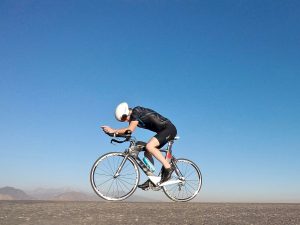
As multisport athletes, triathletes have the unique challenge of navigating potential injuries in three disciplines. Fortunately, there are some basic preventative measures that can mitigate the risk of these injuries. Here are 4 things triathletes can do to prevent injuries:
Be Mindful Of Your Experience In Each Discipline
Most triathletes get into the sport after having spent some time training and competing in one or two of the disciplines. This often means that there is a discipline that they are very inexperienced with. It can be hard to take a new discipline slow and steadily build on it when you are used to performing at a high level. However, doing so goes a long way in preventing some common overuse injuries. For instance, many triathletes come into the sport from cycling and running backgrounds and haven’t swam in years. Taking the swim too fast can both instill poor form if done non-intentionally and may lead to shoulder injuries from overuse.
Cross-Training Is Key
On first glance, it may seem that triathletes are inherently good at cross-training. They practice three disciplines, after all. However, it can be easy to forget some of the functional requirements you will need to remain healthy in training. Core strength is one good example. Focusing on your core can help with triathlons in a lot of ways, like improving bike form to prevent back pain or keeping stability while running to avoid over striding.
Focus On Flexibility And Mobility
Staying flexible is so important for everything triathletes do. Reducing tightness in key areas of the body can help form in all three disciplines and significantly lowers chances of chronic overuse injuries. Take some time to learn specific stretches that help with the aches and pains you feel as you train.
Dealing with any muscle tightness can also be aided by physical therapy, either through appointments with a professional or on your own. At-home care like using foam rollers for acupressure treatments can be really effective in managing tightness. Tight calves, hips, necks, and more can all be helped through regular rolling and stretching.
Listen To Your Body
It can be hard to cut back on your training schedule when an ache or pain starts to creep in. You may have distance and time goals you want to hit before that next big race, and taking time off can seem harmful. However, backing off just a little when you start to notice an issue can prevent long-term problems. This may mean slowing down a workout, cutting back its length, or even skipping it for a rest day. If you respect your body when it’s giving you signals that something is wrong, you’ll be much healthier and able to actually train and compete!
Dr. Stacie Grossfeld has decades of experience helping patients recover from injuries. If you are concerned about an injury you have developed, you deserve the best care possible. For more information on injury treatment and surgery for triathletes, please contact Dr. Stacie Grossfeld and the Orthopaedic Specialists at 502-212-2663.

Recent Comments